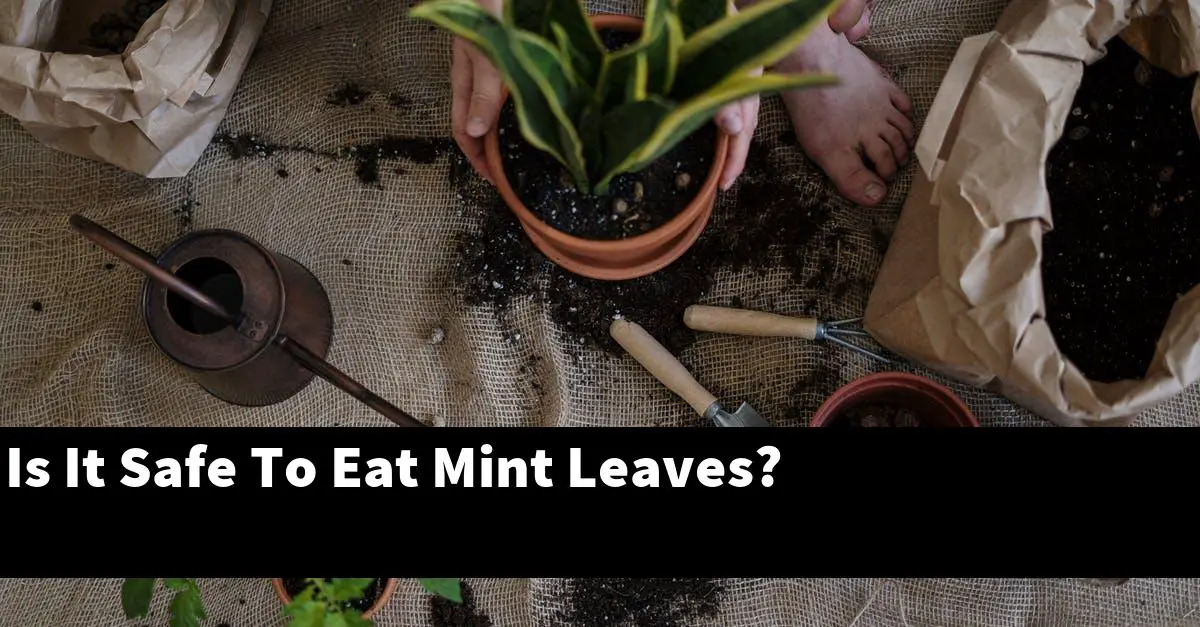Mint leaves are a common ingredient in many dishes, but there are some safety concerns that should be considered before consuming them. Mint leaves can contain harmful compounds that can cause stomach upset and other problems.
It is important to consult with a healthcare provider before consuming mint leaves to ensure they are safe for you.
Is it good to eat mint leaves everyday?
Mint leaves are a popular herb for many people because of the way it affects the mind and body. Mint is a stimulant and has been used for centuries as a natural way to improve circulation and to reduce anxiety and stress.
Mint leaves are also believed to be helpful for the digestive system, including helping to reduce gas and bloating. Additionally, mint is a natural anti-inflammatory, which can help reduce the symptoms of conditions such as arthritis, joint pain, and migraines.
Can you eat too much mint leaves?
Mint leaves are a popular ingredient in many tea and food preparations. The leaves are high in organic acids, which can be beneficial for the digestive system.
However, too much of these acids can actually be harmful. The organic acids can cause stomach cramps and can even lead to vomiting and diarrhea.
Is it safe to eat mint leaves with holes?
Mint leaves are a popular choice for herbal tea, either as a standalone beverage or as part of a mixed tea. Historically, mint leaves have been used for their health benefits, including as an anti-inflammatory and digestive aid.
However, due to the holes in the leaves, mint can also be a source of harmful bacteria. In particular, the bacterium “Staphylococcus aureus” can be found on the leaves, and can cause skin and respiratory infections.
Therefore, it is important to be careful about how you prepare and consume mint leaves. Make sure to wash them well before using, and avoid eating them if you have any cuts or wounds on your skin.
Is eating raw mint leaves good for you?
Raw mint leaves have a number of health benefits. They are high in antioxidants, which can help protect against damage to cells and reduce the risk of cancer.
Mint is also a natural antiseptic, which can help cleanse the body and prevent infections.
How many mint leaves can you eat in a day?
Mint leaves can be eaten in many different ways, but the most popular way is to add them to a salad. For example, a salad with crumbled feta cheese, diced tomatoes, and chopped mint leaves would be a great way to get your daily dose of vitamins, minerals, and antioxidants.
Can you eat mint leaves whole?
The health effects of consuming mint leaves whole are largely unknown. Some anecdotal evidence suggests that consuming mint leaves whole may have health benefits, such as reducing inflammation and helping to relieves symptoms of anxiety and depression.
However, further research is needed to confirm these claims.
Are mint leaves bad for gerd?
It is highly dependent on the individual’s specific diet and health condition. Generally speaking, mint leaves may not be good for people with GERD as they may cause stomach upset or gas.
Additionally, mint leaves may also contain high levels of caffeine, which could aggravate GERD symptoms in some people. If you are suffering from GERD and are considering adding mint leaves to your diet, it is important to speak with a healthcare professional first to see if it is a safe and feasible option for you.
Is it bad to eat too much mint?
There is no definitive answer, but generally speaking, it may not be a good idea to eat a lot of mint. Some research suggests that eating a lot of mint can be harmful because it can increase inflammation in the body.
In addition, mint is also high in oils and calories, so it may not be the best choice if you are trying to maintain a healthy weight.
Is it safe to chew mint leaves?
Mint leaves are a popular herbal supplement and can be consumed in a number of ways, including chewing on them. Mint is a member of the family Lamiaceae and is a hardy perennial.
The leaves are aromatic and have a refreshing, cooling, and stimulating effect on the mouth and throat. Mint is considered safe to consume when used in moderation, and there are no known side effects associated with its use.
Is eating mint leaves good for you?
Mint leaves are a popular herb that is often used for medicinal purposes. Some people believe that consuming mint leaves can be beneficial for overall health.
Mint leaves are high in antioxidants, which can help protect the body against damage from free radicals. Additionally, mint leaves are high in vitamins A and C, which can help promote overall health and fight against infection.
What are the side effects of mint leaves?
Mint leaves can have a number of side effects, including:
• Mouth irritation
• Stomach upset
• Dizziness
• Headache
• Nausea
• Vomiting
• Diarrhea
These side effects can generally be avoided by taking care to avoid contact with the leaves and using a fresh, rather than dried, product. If side effects do occur, they may be alleviated by taking medications such as ibuprofen or acetaminophen.
Final Thoughts
Mint leaves are safe to eat and are actually quite good for you. They contain essential oils that can help to soothe your stomach and aid in digestion.
Mint leaves can also help to freshen your breath.

